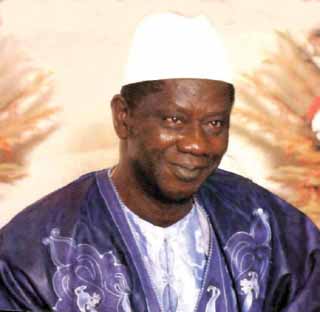Tens of thousands attend funeral of Guinea's Conte
 Conakry - Tens of thousands of Guineans joined regional leaders Friday at the funeral of President Lansana Conte, whose death earlier this week triggered a coup.
Conakry - Tens of thousands of Guineans joined regional leaders Friday at the funeral of President Lansana Conte, whose death earlier this week triggered a coup.
The presidents of Sierra Leone, Guinea-Bissau, Ivory Coast and Liberia were amongst the crowds who packed into the national stadium in the capital Conakry.
The second-in-command of the military coup also attended the funeral and paid tribute to the man who ruled the West African for 24 years after seizing power in a bloodless coup.
Conte managed to uphold peace in Guinea as many neighbouring nations descended into civil wars.
However, in recent years his leadership was tested by a military mutiny, anti-government riots and strikes over the rising cost of food and fuel.
The leader was known to suffer from diabetes and was a heavy smoker. His exact birth date is not known, but he was believed to have been 74.
His body will be buried in his home village of Lansanaya, around 120 kilometres north-west of Conakry.
The military leader who has taken Conte's place is trying to reassure the international community about their intentions.
Captain Moussa Dadis Camara said in a statement on national radio late Thursday that the UN, EU, African Union and the Economic Community of West African States
(ECOWAS) were amongst those invited for a meeting aimed at clarifying the junta's intentions.
All of these bodies have condemned the coup.
The talks are scheduled to take place around midday on Saturday.
The junta's invitation came as government leaders who turned themselves over to the military pledged their support for the new regime.
Camara had earlier given ministers a deadline of 24 hours to hand themselves in to an army barracks or face being hunted down.
Some 30 ministers have given themselves up, among them Prime Minister Ahmed Tidiane Souare, who said the government was at the coup leaders' "complete disposal."
The government had earlier claimed it was still in control and called on the international community to intervene.
Camara declared himself president on Wednesday evening after parading past cheering crowds in the streets of the capital Conakry.
The coup leaders have named a national council made up of 26 military leaders and six civilians to replace the government.
Camara said that he has no interest in holding on to power and would arrange "free, fair and transparent" elections for 2010.
Despite the coup's success, analysts are warning that months of uncertainty lay ahead, saying that without Conte's iron fist to keep the nation in line there could be counter-coups.
Guinea is still largely poverty-stricken despite having the world's largest reserves of bauxite, an ore used to make aluminium, and significant deposits of gold and diamonds. (dpa)